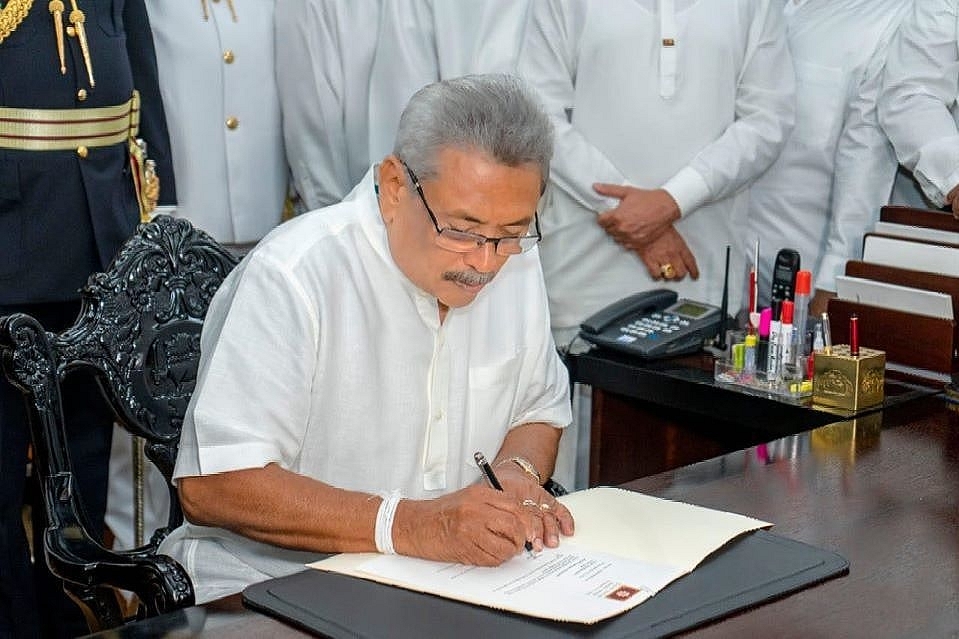News Brief
Sri Lanka Cancels Colombo East Container Terminal Deal With India Under Trade Unions' Pressure, Offers 'Better Alternative'
- On 28 January, Colombo Port’s 23 trade unions, backed by over 220 unions across the island nation, began a protest against the project being given to 'foreign' companies.
- However, a Chinese company, backed by the Xi Jinping government, operates an international container terminal at the Colombo harbour adjacent to the Eastern Container Terminal.

Sri Lankan President Gotabaya Rajapaksa. (Facebook)
The Gotabaya Rajapaksa government in Sri Lanka has scrapped an agreement to develop a strategic East Container Terminal (ECT) at the Colombo port with help from India and Japan.
However, the Sri Lankan government has offered India and Japan an opportunity to develop the port’s West Container terminal as a reconciliation move.
India protested the move strongly with its High Commission in Colombo saying that “all sides should abide by the existing understandings and commitment” in timely implementation of the agreement signed in 2019.
Succumbing to pressure from week-long protests by trade unions and Opposition parties, the Lankan government decided to terminate the agreement yesterday (2 February 2021).
On 28 January, Colombo Port’s 23 trade unions, backed by over 220 unions across the island nation, began a protest against the project being given to “foreign” companies.
The plans for the Eastern Container Terminal were announced in August 2016 by then Sri Lankan Minister of Ports Arjuna Ranatunga.
Ranatunga announced that an Indian company would be invited to develop the terminal at Colombo port for geo-political reasons. The then prime minister, Ranil Wickremesinghe, was also keen on India’s involvement in Sri Lanka’s development programmes.
An Indian company had submitted a proposal for developing the terminal but Maithripala Sirisena, who was the president then, rejected the investment, saying that Lankan national assets such as ports cannot be handed over to foreign entities.
The container project gained some momentum in May last year with India, Sri Lanka and Japan signing a memorandum of cooperation (MoC) for the development and operation of the ECT. Lankan President Rajapaksa was keen on honouring it.
According to the MoC, a terminal operations company would be set up for conducting all operations. Sri Lanka would have 51 per cent stake in it, India 15 per cent and the joint venture partners the rest.
Japan agreed to fund the project by extending a 40-year loan at an interest rate of 0.1 per cent.
In its statement, the Indian High Commission pointed out that the Rajapaksa government had made a commitment in honouring the agreement several times in the past.
The Lankan Cabinet had also taken a decision in November last year to implement the project with foreign investors.
“All sides should continue to abide by the existing understandings and commitment,” the High Commission said.
Over the last couple of weeks, trade unions and Opposition parties had been demanding that Lanka end the terminal agreement, arguing that they preferred total control of the ECT by the Sri Lankan government.
The protests against the ECT deal dates back to July last year when the trade unions began opposing the deal, saying India was putting pressure on the Rajapaksa government.
Trade union leaders had also promised an income of Sri Lankan Rs 5 crore (Indian Rs 1.88 crore) every month if the ECT was a total Sri Lankan venture.
In August last year, the port workers ended a strike on the agreement with India after Lankan Prime Minister Mahinda Rajapaksa assured them that the terminal would not be “handed over to India”.
The Lankan Prime Minister reiterated his stand in Parliament last month when he said that the island nation government had not decided to hand over ECT management, “in whole or in part, to any foreign company”.
The ECT agreement figured during External Affairs Minister S Jaishankar’s visit to Sri Lanka last month with India remaining firm in its commitment. He had indicated India’s priority for the project.
India has been keen on the ECT agreement as it wants to make its presence felt at the Colombo Port as transshipment of Indian cargo accounts for nearly three-fourths of the port’s business.
This is particularly in view of a Chinese company, backed by the Xi Jinping government, operating an international container terminal at the Colombo harbour adjacent to the Eastern Container Terminal.
New Delhi also considers the Indian Ocean region to be its strategic backyard and has expressed its concerns over Beijing’s economic and political influence over Colombo.
China, on the other hand, considers Sri Lanka to be a critical link in its massive Belt and Road Initiative and has provided billions of dollars in loans for its projects over the past decade. The projects include a seaport, airport, port-city, highways and power stations.
The New Indian Express quoted a Sri Lanka Port Authority official as saying that the offer to develop the West Container terminal was better commercially as developers would get 85 per cent stake.
It was also the same from the security point of view if India was concerned over the issue and felt compelled to have a terminal.
Introducing ElectionsHQ + 50 Ground Reports Project
The 2024 elections might seem easy to guess, but there are some important questions that shouldn't be missed.
Do freebies still sway voters? Do people prioritise infrastructure when voting? How will Punjab vote?
The answers to these questions provide great insights into where we, as a country, are headed in the years to come.
Swarajya is starting a project with an aim to do 50 solid ground stories and a smart commentary service on WhatsApp, a one-of-a-kind. We'd love your support during this election season.
Click below to contribute.
Latest